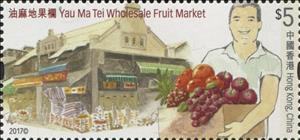Stamp: Markets of Hong Kong (Hong Kong 2017)
Markets of Hong Kong (Hong Kong 2017)
19 September (Hong Kong ) within release Markets of Hong Kong goes into circulation Stamp Markets of Hong Kong face value 5 Hong Kong dollar
| Stamp Markets of Hong Kong in catalogues | |
|---|---|
| Michel: | Mi: HK 2147 |
Stamp is square format.
Also in the issue Markets of Hong Kong:
- Stamp - Markets of Hong Kong face value 1.70;
- Stamp - Markets of Hong Kong face value 5;
- Stamp - Markets of Hong Kong face value 2.90;
- Stamp - Markets of Hong Kong face value 3.10;
- Stamp - Markets of Hong Kong face value 2.20;
- Souvenir Sheet - Markets of Hong Kong face value 18.60;
- Stamp - Markets of Hong Kong face value 3.70;
|
Data entry completed
50%
|
|
|---|---|
| Stamp Markets of Hong Kong in digits | |
| Country: | Hong Kong |
| Date: | 2017-09-19 |
| Print: | Offset lithography |
| Emission: | Commemorative |
| Format: | Stamp |
| Face Value: | 5 Hong Kong dollar |
Stamp Markets of Hong Kong it reflects the thematic directions:
In botany, a fruit is the seed-bearing structure in flowering plants (also known as angiosperms) formed from the ovary after flowering. Fruits are the means by which angiosperms disseminate seeds. Edible fruits, in particular, have propagated with the movements of humans and animals in a symbiotic relationship as a means for seed dispersal and nutrition; in fact, humans and many animals have become dependent on fruits as a source of food. Accordingly, fruits account for a substantial fraction of the world's agricultural output, and some (such as the apple and the pomegranate) have acquired extensive cultural and symbolic meanings. In common language usage, "fruit" normally means the fleshy seed-associated structures of a plant that are sweet or sour, and edible in the raw state, such as apples, bananas, grapes, lemons, oranges, and strawberries. On the other hand, in botanical usage, "fruit" includes many structures that are not commonly called "fruits", such as bean pods, corn kernels, tomatoes, and wheat grains. The section of a fungus that produces spores is also called a fruiting body.
n economics, a market is a composition of systems, institutions, procedures, social relations or infrastructures whereby parties engage in exchange. While parties may exchange goods and services by barter, most markets rely on sellers offering their goods or services (including labour power) to buyers in exchange for money. It can be said that a market is the process by which the prices of goods and services are established. Markets facilitate trade and enable the distribution and allocation of resources in a society. Markets allow any tradeable item to be evaluated and priced. A market emerges more or less spontaneously or may be constructed deliberately by human interaction in order to enable the exchange of rights (cf. ownership) of services and goods. Markets generally supplant gift economies and are often held in place through rules and customs, such as a booth fee, competitive pricing, and source of goods for sale (local produce or stock registration).


